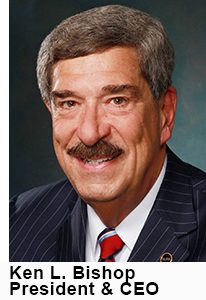SHARE:

 Several years ago, I decided to reference a few of my President’s Memos from that year in my “President’s Report” presentation at the NASBA Annual Business Meeting. Immediately after my speech, Past NASBA Chair Mark Harris approached me and said: “That was great: You need to use your Memos in all of your speeches.” While I recognize the “great” part was an exaggeration, it was consistent with the supportive nature of Chair Harris. I took his recommendation to heart and have included some Memo references in every annual “President’s Report” since then. As a result, I now find myself writing Memos that anticipate what I will likely cover in my speech. This is one of those coming attraction messages. Several years ago, I decided to reference a few of my President’s Memos from that year in my “President’s Report” presentation at the NASBA Annual Business Meeting. Immediately after my speech, Past NASBA Chair Mark Harris approached me and said: “That was great: You need to use your Memos in all of your speeches.” While I recognize the “great” part was an exaggeration, it was consistent with the supportive nature of Chair Harris. I took his recommendation to heart and have included some Memo references in every annual “President’s Report” since then. As a result, I now find myself writing Memos that anticipate what I will likely cover in my speech. This is one of those coming attraction messages.
Let me begin by providing a bit of NASBA history in which I either was a witness or played a role. In 2006, it became clear to NASBA and AICPA that the concept of “substantial equivalency,” which had been established in the Uniform Accountancy Act, was not working as intended. It was meant to bring meaningful improvements in reciprocal practice privileges for CPAs licensed in states determined to be substantially equivalent. Leadership was determined to advance mobility practice privileges legislation in all jurisdictions.
At the time, when I was the Executive Director of the Missouri Board of Accountancy, I received a call from NASBA Chair Wes Johnson asking if I would head up NASBA’s mobility efforts, working with a coalition of the AICPA and The Accountants Coalition. The concept made sense to me. In fact, I had been in discussions with Carlos Johnson, then Chair of the Oklahoma Board of Accountancy (later to become a NASBA Chair), about establishing mobility practice privileges between Missouri and Oklahoma. The Missouri Board members supported my taking on the new role, one that took me out of the state for significant amounts of time.
The early days of my “mobility adventure” were interesting. I very quickly heard from some senior NASBA folks that: “Mobility will never happen.” A few of my fellow Executive Directors advised that they would never allow mobility legislation in their state, and a couple even let me know that I would not be welcomed in their state if I would be there to promote mobility. Again, interesting times!
As I learned all I could about the mobility concept, the first revelation was cross-border practice privilege mobility had never been achieved, not only in the United States, but in the world. I also became convinced that our governance leadership was right, and that we needed to be successful. Persistence became very important. Our coalition put working rules into place that mobility had to achieve three important elements: no notice, no fee − and no escape. We had to be persistent in driving for consistency because any jurisdiction that adopted less than all three elements would not be considered a “mobility state.” According to the Oxford Dictionary, “persistence” is firm or obstinate continuance in a course of action in spite of difficulty or opposition.
The issue with persistence in the U.S. regulatory world is individual states exercise their autonomous state’s rights, and persistence will not work if buy-in and acceptance are not achieved. Our mobility team learned quickly that we needed to listen, understand opposing viewpoints and be respectful of the opinions of others, but we knew we had to persevere, holding the course. We also developed the tenacity to advance in spite of some occasionally loud opposition. Probably the best education I received was seeing that those opposed to something often have the loudest voices, and those who support it frequently do so quietly. Also, we ascertained that the majority of stakeholders take a wait-and-see position and maintain a willingness to be educated.
I have been around the regulation of accountancy long enough to have seen the resistance to change including non-CPA ownership and conversion to a computerized examination, both of which have served the profession well. We are now facing the challenges associated with the “evolution of the profession.” As with earlier significant changes, the profession’s initial response to suggested proactive steps to transition has been predictably negative. Like mobility, firm ownership, computerization of the exam and so many evolutionary changes that have occurred in the profession, the threats associated with failing to evolve with technology are beginning to become apparent. We must be prepared.
Our goal is to be respectful and patient, but remain constant in our persistence, perseverance and tenacity.
I hope to see you all in Boston for what is going to be a formidable NASBA Annual Meeting!
Semper ad meliora (Always toward better things).
— Ken L. Bishop
President & CEO
|


